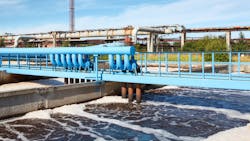Wastewater Treatment, Advanced Tech, and Water Reuse
Wastewater treatment equipment are a wide range of products designed to purify contaminated water for safe reuse or discharge. Key equipment include screening systems to remove solids, grit removal units, clarifiers for sedimentation, biological reactors for breaking down organic matter, and advanced technologies such as membrane bioreactors and dissolved air flotation. These systems serve municipal sewage plants, food and beverage processing facilities, the pharmaceutical industry, and other industrial sectors, enabling water recycling for irrigation, cooling, and reduced environmental impact. Innovations such as smart sensors and advanced oxidation processes further enhance efficiency, ensuring sustainable and reliable wastewater management.
Revolutionizing Wastewater Management
In the past few years, the wastewater treatment equipment industry has witnessed significant growth due to rise in the integration of modern technologies such AI and IoT. According to Allied Market Research, the sector is expected to rise at a CAGR of 4.2% from 2021 to 2030.
AI and IoT are transforming wastewater treatment by enabling smarter, more responsive operations. With smart sensors and connected devices installed throughout treatment plants, operators are able to continuously monitor water quality, flow rates, and equipment performance in real time. AI algorithms process this vast data stream to optimize chemical dosing, adjust treatment parameters, and predict equipment failures before they occur, ensuring timely maintenance.
This proactive approach enhances process efficiency and reliability, significantly reducing energy consumption and operational costs. AI and IoT integration helps facilities maintain regulatory compliance, minimize environmental impact, and deliver consistently high-quality treated water by automating complex decision-making and improving system responsiveness. This sets new standards for modern wastewater management.
MBR Systems
Moreover, advanced membrane filtration systems including Membrane Bioreactors (MBR), nanofiltration, and ultrafiltration, are revolutionizing wastewater treatment with unparalleled purification capabilities. These technologies effectively eliminate suspended solids, bacteria, viruses, and even dissolved contaminants, producing water suitable for reuse or safe discharge.
MBR systems merge biological treatment with membrane filtration, enabling compact plant designs and high-quality effluent ideal for irrigation or industrial processes. With rise in demand for energy efficient solutions, modern membranes operate at lower pressures, reducing power consumption. Their versatility makes them ideal for municipal sewage plants, food & beverage industries, and pharmaceutical sectors, addressing diverse needs while ensuring compliance with stringent environmental standards and sustainable water management goals.
Decentralized Systems
Decentralized wastewater treatment systems have become popular due to their adaptability, cost-effectiveness, and environmental benefits. Unlike conventional centralized plants, these modular units treat wastewater at or near its source, significantly reducing installation and maintenance expenses. Their scalable design makes them ideal for rural communities, remote locations, and rapidly expanding urban areas where infrastructure is limited.
Decentralized systems enhance opportunities for water reuse, supporting sustainable resource management. Prefabricated, plug-and-play solutions such as SUSBIO ECOTREAT illustrate this innovation, offering quick setup, energy efficiency, and durable construction tailored to diverse environments. As a result, these systems are transforming wastewater management with greater flexibility and resilience.
Industrial and Municipal Applications
Wastewater treatment equipment finds extensive application across a wide array of industries and municipal systems, playing a critical role in environmental protection and resource management. In manufacturing and heavy industries such as pulp & paper, steel, chemicals, oil & gas, and power generation, specialized equipment such as decanter centrifuges, filter presses, and membrane filtration systems are used to treat processed[SS1] water, remove solids, oils, and toxic chemicals, and enable water recycling within the facility.
These solutions help industries minimize water consumption, reduce waste output, and comply with increasingly stringent environmental regulations. Treated wastewater is often reused for cooling, boiler feed, or as process water, resulting in significant cost savings, reduced freshwater demand, and enhanced sustainability.
Apart from industrial use, wastewater treatment equipment is essential for municipal applications, where it ensures safe treatment of domestic sewage and stormwater before discharge or reuse. Modular and mobile treatment plants are particularly valuable in rural or rapidly urbanizing areas, providing scalable and efficient solutions where infrastructure is limited.
Treated effluent wastewater is increasingly reused for irrigation, landscape watering, and even aquifer recharge, supporting water conservation efforts in regions facing scarcity. Advanced treatment technologies enable the recovery of valuable byproducts, such as biogas or nutrients, further enhancing the economic and environmental benefits.
Ingersoll Rand and SSI Aeration
In February 2025, Ingersoll Rand, an American multinational, announced its acquisition of SSI Aeration and its subsidiaries to enhance its wastewater treatment capabilities. SSI, which generates approximately $30 million in annual revenue, specializes in energy-efficient engineered membrane diffusers, including fine and coarse bubble diffusers and aeration systems.
This acquisition is expected to allow Ingersoll Rand to integrate its technologies, such as low-pressure compressors, with SSI’s aeration solutions to deliver a comprehensive, end-to-end offering for wastewater treatment. Vicente Reynal, Ingersoll Rand’s CEO and the chairman, said this acquisition strengthens the position of the company in the growing wastewater treatment industry.
Demand Drives Evolution
The evolution of wastewater treatment equipment, driven by AI, IoT, membrane technologies, and decentralized systems, is revolutionizing how industries and municipalities manage water. These innovations enhance treatment efficiency, support water reuse, and ensure compliance with strict environmental standards.
With the rise in global demand for sustainable water solutions, advanced treatment systems offer a reliable path to resource conservation and pollution reduction. Continuous innovations in wastewater management are expected to make this procedure more adaptive, cost-effective, and beneficial for businesses to achieve long-term environmental and operational sustainability goals.
